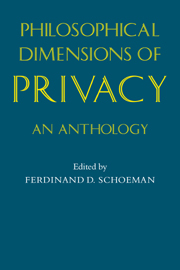Book contents
- Frontmatter
- Contents
- List of contributors
- Preface
- 1 Privacy: philosophical dimensions of the literature
- 2 Social distance and the veil
- 3 The origins of modern claims to privacy
- 4 The right to privacy [the implicit made explicit]
- 5 Privacy [a legal analysis]
- 6 Privacy as an aspect of human dignity: an answer to Dean Prosser
- 7 Privacy [a moral analysis]
- 8 Privacy, freedom, and respect for persons
- 9 Privacy and self-incrimination
- 10 Intimacy and privacy
- 11 The right to privacy
- 12 Why privacy is important
- 13 Privacy, intimacy, and personhood
- 14 Privacy: some arguments and assumptions
- 15 An economic theory of privacy
- 16 Privacy and the limits of law
- 17 Privacy and intimate information
- Selected bibliography
- Index of names
7 - Privacy [a moral analysis]
Published online by Cambridge University Press: 12 December 2009
- Frontmatter
- Contents
- List of contributors
- Preface
- 1 Privacy: philosophical dimensions of the literature
- 2 Social distance and the veil
- 3 The origins of modern claims to privacy
- 4 The right to privacy [the implicit made explicit]
- 5 Privacy [a legal analysis]
- 6 Privacy as an aspect of human dignity: an answer to Dean Prosser
- 7 Privacy [a moral analysis]
- 8 Privacy, freedom, and respect for persons
- 9 Privacy and self-incrimination
- 10 Intimacy and privacy
- 11 The right to privacy
- 12 Why privacy is important
- 13 Privacy, intimacy, and personhood
- 14 Privacy: some arguments and assumptions
- 15 An economic theory of privacy
- 16 Privacy and the limits of law
- 17 Privacy and intimate information
- Selected bibliography
- Index of names
Summary
Privacy has become the object of considerable concern. The purely fortuitous intrusions inherent in a compact and interrelated society have multiplied. The more insidious intrusions of increasingly sophisticated scientific devices into previously untouched areas, and the burgeoning claims of public and private agencies to personal information, have created a new sense of urgency in defense of privacy. The intensity of the debates about electronic eavesdropping and the privilege against self-incrimination are but two examples of this urgency.
The purpose of this essay is not to add yet another concrete proposal, nor even to call attention to yet another intrusion upon privacy. Rather I propose to examine the foundations of the right of privacy—the reasons why men feel that invasions of that right injure them in their very humanity.
To bring out the special quality of the concern over privacy I shall first put a not entirely hypothetical proposal, which should serve to isolate from restrictions and intrusions in general whatever is peculiar about invasions of privacy.
There are available today electronic devices to be worn on one's person which emit signals permitting one's exact location to be determined by a monitor some distance away. These devices are so small as to be entirely unobtrusive: other persons cannot tell that a subject is “wired,” and even the subject himself—if he could forget the initial installation—need be no more aware of the device than of a small bandage.
- Type
- Chapter
- Information
- Philosophical Dimensions of PrivacyAn Anthology, pp. 203 - 222Publisher: Cambridge University PressPrint publication year: 1984
- 51
- Cited by



